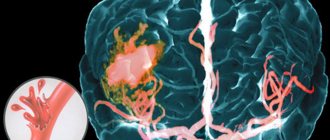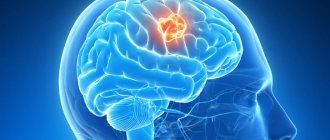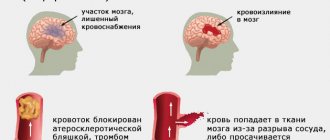Alcohol as a risk factor for stroke
Any alcohol contains ethanol, which, when released into the blood, changes the functioning of the entire cardiovascular system. With regular consumption of alcohol, the walls of blood vessels become thinner, the composition of the blood changes - the number of red blood cells decreases. The remaining blood cells under the influence of alcohol simply stick together and can, forming blood clots, block the cross-section of the vessel.
Ethanol also disrupts the metabolism of fats in the blood; plaques appear in the vessels, which increase the risk of thrombosis.
Thrombosis
The following changes occur in the cardiovascular system:
- blood vessels dilate;
- blood pressure rises;
- the load on the heart increases;
- pulse quickens.
As ethanol breaks down, the blood vessels narrow, but the pressure remains high. The walls of the brain vessels are under severe stress and may not withstand the pressure. The result is bleeding in the brain. This phenomenon occurs in people who frequently drink alcohol, especially strong drinks.
Alcohol after a stroke: harm to the body
The most common justification for alcohol abuse is the fact that alcohol dilates blood vessels. The mechanism of action of alcohol on blood vessels is that in the first stage there is a sharp dilation of blood vessels, after which in the second stage they rapidly narrow. After a stroke, the blood vessels of the brain become fragile due to insufficient blood supply. Any stress on the vessels can cause repeated hemorrhage, so stroke and alcohol are incompatible.
Regular drinking can lead to serious problems. Alcohol causes:
- development of cardiovascular diseases: heart disease, thinning of vascular walls; atherosclerosis, blood clot formation;
- loss of control of well-being and sensations, which does not allow a person to identify the symptoms of the disease;
- increased cholesterol levels in the blood, the formation of fatty plaques on the walls of blood vessels, and excess weight gain;
- increased blood pressure and blood sugar, which is a factor in the development of stroke.
Alcohol contains toxins that destroy oxygen-carrying red blood cells in the blood, causing gas exchange to be disrupted. Drinking alcoholic beverages and fatty foods increases the risk of hypertensive crisis. A person who is a patient of a neurologist knows that stroke and alcohol are a dangerous combination. These risk factors can be superimposed on an existing disease, which can trigger a stroke.
Features of stroke
Stroke is a pathology of cerebral circulation. It occurs as a result of hemorrhage in the brain or blockage of blood vessels. A stroke is dangerous with a high probability of death for the patient. The outcome of the attack depends on the time of first aid.
The following signs allow you to understand that this is a stroke:
- paralysis of one half of the body;
- distorted face, inability to smile;
- speech disorders;
- facial redness, fever;
- noise in the head, pain, dizziness;
- dyspnea;
- darkening of the eyes;
- nausea.
Signs of a stroke can easily be confused with intoxication, so the patient is asked to smile or stick out his tongue - with hemorrhage, the tongue and corners of the mouth will be slanted down to one side. Or they ask you to raise your arms - during an attack it is impossible to raise both arms, one will be weaker than the other. If such symptoms are observed, you should urgently call an ambulance, since the time to save a life is no more than 4 hours.
Depression and stroke
Despite the impressive steps taken by medicine towards prolonging human life, there are still a number of diseases that are completely beyond its control. These include stroke. Progress in the fight against stroke over the past decades has been impressive, but complete victory is still far away - so scientists are considering a variety of factors that can help them with this. In addition to the well-known risk factors for stroke - poor diet, obesity, sedentary lifestyle, smoking, heart and vascular disease - there is also a connection between stroke and depression. In many cases, depression is not given enough attention, and the impact of mood disorders on a person’s physical condition is underestimated. About how important it is to promptly identify and treat depression, about the role of a person’s emotional health in the prevention of strokes in the author’s column by Natalia Stilson.
Depression can strike a person at any time in his life and can change many things for the worse. The cause of a mood disorder can be some life events or illnesses that a person suffers from. We are talking about both mental illnesses and diseases of internal organs.
From a bad mood to illness one step
Depressive conditions have long taken an “honorable” place among the risk factors for many diseases. It is known that people with a mood disorder live shorter lives than those without the disorder. For a long time it was thought that the reason lay in genes or metabolism, which changes with depression. Permanently depressed mood, according to this hypothesis, can affect the functioning of the entire body and, as a result, cause diseases. Now, despite the fact that this effect of depression has not been completely refuted, it is assumed that the increase in the risk of disease occurs due to changes in the patient’s behavior.
If a person is in a low mood, then, as a rule, he takes less care of himself, moves less, and eats fattier and higher-calorie foods. Depressed patients are, on average, more likely to smoke, drink alcohol, and take other psychoactive substances.
So it is not depression itself that undermines health, but the person acting under its influence. Strokes and conditions associated with them are no exception. Emotional health can have a significant impact on the body. Depression not only increases the risk of stroke, but also affects the prognosis of recovery.
Pre- and post-stroke depression
It is known that depression is one of the factors that increases the risk of developing a vascular accident. People with depressed mood develop a stroke 45% more often than those whose mood is within normal limits. And if a vascular accident has already happened, then the risk of dying in depressed patients is on average 55% higher. The data is impressive, however, according to many experts, the connection between depression and strokes has not received enough attention. Stroke is often cited as one item on a long list of complications of mood disorders.
Much more attention has been paid to post-stroke depression. The reason is that post-stroke depression greatly influences the outcome of a vascular accident. Currently, this disorder ranks first among the “psychiatric” complications of stroke. According to statistics, 2/3 of post-stroke patients suffer from depression of varying severity. In 1/3 this disorder occurs in a rather severe form.
There is no consensus among scientists about who suffers from depression more often, men or women. Some believe that the disease does not depend on gender, others argue that the weaker sex is more susceptible to this disease. Depression after a stroke has its own developmental characteristics. It begins in patients at different times.
Mostly this occurs immediately after a vascular accident. More than 30% of patients are discharged from the hospital in a normal emotional state, and only then do they develop depression. The peak of mood disorders occurs in the third to sixth month after a stroke. After a year, in 50% of patients, depression goes away on its own, but there are also many who suffer from low mood for several years, becoming chronic.
The Dangers of Undiagnosed Depression After Stroke
Mood disorder after a stroke changes the patient's behavior. On average, such a person recovers two years later than those whose emotional background is normal. A patient with depression often does not follow a diet or exercise regimen, or does not take pills on time. He is less likely to engage in rehabilitation activities and consults with specialists, even if he feels unwell. As a result, the risk of developing a recurrent stroke significantly increases.
Very often, depression goes unnoticed and remains undiagnosed. There are several reasons for this.
- First, some symptoms of depression are very similar to the effects of a stroke. People perceive inactivity, silence, and refusal to communicate as the result of brain damage.
- Secondly, people who have suffered a stroke very often find it difficult to correctly explain their condition due to problems with speech.
- Thirdly, many people believe that an elderly person (and strokes are more common in the elderly) are “supposed” to be depressed. Because why should an old man have fun, and even with a stroke?
What should those at risk know?
No one is 100% immune from stroke. However, we have the power to reduce the risks of its development. And in addition to traditional advice on diet, sports and the treatment of chronic heart and vascular diseases, it is necessary to pay attention to depression. Here are a few things to know:
- Depression is a disease that needs to be treated without waiting for bad outcomes. It doesn’t matter at all whether a person is old or young, healthy or suffers from chronic diseases - a mood disorder in any case is not the norm.
If you are in a low mood most of the time, you sleep poorly and think about your worthlessness and hopelessness in life, you need to visit a doctor. A psychiatrist diagnoses depression. It determines how seriously ill a person is and what treatment is best for him. Some people need psychotherapy, while others are better off taking medications. - If you or a family member has suffered a stroke, it is worth keeping in mind that depression may occur. If a bad mood lasts more than a week, you should definitely inform your doctor about it. The doctor will decide whether additional consultations are necessary or change the treatment plan if necessary.
- Whatever the situation with your mood, make it a rule to follow doctors' orders during rehabilitation after a stroke. Your attention to yourself is the key to restoring your health.
- Do not self-medicate. Currently, you can buy almost any “mood” product at the pharmacy, but you should first consult with your doctor. Without being a specialist, you may make a mistake in choosing medications. You also need to be aware of the combination of medications and treatments you will be taking. Do not forget that even herbal remedies affect the body’s condition during conventional therapy.
Natalia Stilson
Photo thinkstockphotos.com
Types of strokes from alcohol
Alcohol abuse provokes the development of 2 types of stroke:
- Ischemic. Occurs due to vascular spasm due to blockage by a blood clot. Blood stops circulating to the brain, tissues begin to lack oxygen and gradually die.
- Hemorrhagic. It causes rupture of the vascular wall in the brain, which also causes oxygen starvation of the damaged area of the brain. Neurons gradually stop functioning and die.
Stroke
The effect of alcohol on a person after a stroke
The consequences of a stroke can last a person's entire life. Drinking alcohol after a stroke can increase negative symptoms:
- dehydration of the body;
- insomnia;
- speech disorder;
- decreased motor activity of the limbs;
- depression, anxiety-phobic disorders;
- metabolic disorders, especially lipid metabolism;
- deficiency of B vitamins;
- failure of the liver and kidneys.
Therefore, when asked by a patient: is it possible to drink alcohol after a stroke, doctors answer unequivocally: no, under no circumstances.
Attention! Even minimal doses are strictly prohibited.
Expert opinion on alcohol use after stroke
Cardiologists, together with neurologists and other specialists, fight every day for the health of patients, and I recommend adhering to a healthy lifestyle. In recent years, there has been a decrease in the age of stroke, the reason for this in most cases is the wrong attitude of people towards their own health.
Doctors' opinions regarding alcohol consumption vary. Some experts are of the opinion that drinking alcohol in limited quantities after a stroke is beneficial. Red wine and cognac improve cerebral circulation, which is confirmed by research data. The opposite opinion of neurologists indicates that alcohol in any quantity is harmful to the body, it leads to human degradation. Some doctors consider stroke a hidden consequence of this bad habit.
The neurology clinic employs leading specialists who successfully treat diseases of the nervous system. For each patient at the Yusupov Hospital, an individual therapeutic or rehabilitation complex is developed to achieve maximum effect in treating the disease or eliminating the consequences. Make an appointment with a neurologist at the Yusupov Hospital by phone.
When is drinking alcohol strictly prohibited?
You should definitely stop drinking alcohol if the patient has suffered a serious stroke. Any dose of alcohol can provoke a relapse and death. If a person has suffered a stroke without serious consequences, he feels well - perhaps the doctor will allow him to drink a little afterwards, but this is unlikely. Drinkers cannot control themselves, so it is better not to take risks.
It is strictly forbidden to drink in the following cases:
- therapy - taking medications implies a complete abstinence from alcohol, since alcohol and medications are incompatible;
- hypertension - ethanol can cause rupture of a cerebral aneurysm;
- rehabilitation period after an attack - during this time the likelihood of a second attack or micro-stroke is high;
- severe complications - destructive changes in joints, impaired vision, speech;
- chronic alcoholism - when a stroke was caused by the abuse of alcoholic beverages.
However, some experts argue that you can drink alcohol in small doses after a stroke.
The risk of developing a stroke is much higher in people who abuse alcohol than in those leading a sober lifestyle. A stroke is an acute disorder of cerebral circulation that develops suddenly and often leads to disability and death. It ranks among the top causes of death worldwide.
There are two types of stroke: ischemic and hemorrhagic. The first occurs as a result of a blockage in the artery that transports blood to the brain. Usually the cause of this disorder is a blood clot. This type of stroke occurs in 70% of cases. Hemorrhagic occurs as a result of bleeding in the brain, which occurs when the walls of a blood vessel rupture. Not only are people at risk of prematurely suffering from a stroke not only those who periodically drink excessively, but also those who regularly drink small amounts of alcohol. Among the main mechanisms that contribute to the development of stroke under the influence of alcohol, the following should be noted. Drinking alcohol increases blood pressure, which increases the risk of rupture of weakened vessel walls. With chronic alcoholism, irreversible dystrophic changes develop in the vessels, which makes them defenseless and brittle. Thus, arteries can rupture under minimal negative influence with the formation of hemorrhage, and they are also susceptible to atherosclerosis and blockage with the further development of cerebral infarction. Elevated doses of alcohol provoke the development of not only atherosclerosis and hypertension, but also diabetes mellitus, the third important risk factor for stroke. An important mechanism for the increase in the incidence of stroke is that alcoholics lose vigilance to the state of their health and do not seek medical help, thus missing the alarming symptoms and ailments that lead to a cerebral stroke. Alcohol has a toxic effect not only on brain cells, but also on all organs, in particular the liver, kidneys, heart, and hematopoietic organs. This in turn leads to disruption of all metabolic processes in the body and primarily helps to increase blood viscosity. Such thick blood is an excellent substrate for the formation of blood clots and emboli, which cause blockage of cerebral vessels and more. Alcohol causes dystrophic changes in the heart muscle. This leads to its malfunction, to diffuse cardiosclerosis and the occurrence of cardiac arrhythmia. Particularly dangerous in this case is atrial fibrillation, which is the source of the formation of emboli, which are carried through the bloodstream into the vessels of the brain and cause an ischemic stroke. It is important to remember that alcohol abuse most often leads to the most severe type of acute cerebrovascular accident - hemorrhagic stroke, which is associated with high mortality in the acute period and subsequent disability. Therefore, for people who experience the effects of provoking factors, the doctor of the neurological department of Hospital No. 1, Alimaa Shyirap, recommends switching to a complete abstinence from alcohol. The expected benefits of drinking alcohol will be much lower than the potential harm.
When and how much can you drink?
At the end of the rehabilitation period after a stroke, drinking alcohol is extremely undesirable, but if you don’t care about your life, then you can do so in strictly limited quantities. Doctors recommend drinking separate alcoholic beverages, but this can be done no more than 1-2 times a month.
Alcohol consumption
What can you drink from alcohol after a stroke:
- beer - no more than 250 ml;
- wine - no more than 200 ml;
- cognac - 30-50 ml;
- vodka - 30-50 ml.
Experts recommend choosing dry red wine , to which no additional ethyl alcohol is added. This wine is produced by fermenting grapes, so it is beneficial for healthy people and not so critical for a stroke survivor. But its dosage should be strictly limited.
It is better to abstain from drinking other alcoholic beverages after a stroke, especially strong ones.
To quell your desire to drink more, you need to follow some rules:
- drink in small sips;
- After each sip, place the glass on the table;
- try to “skip” toast or alternate alcohol and another drink - juice, for example;
- do not snack on salty and fatty foods;
- don't drink alone;
- drink on a full stomach;
- choose small volumes of bottles of alcohol.
Also, many experts advise keeping a diary, which will describe when and how much you drank.
Red wine
Red wine is an alcoholic drink produced using a certain technology from dark grape varieties. Usually red or blue-black. Red wines have a vibrant color that ranges from bright red to burgundy. In the production of red wine, a method is used to ensure the transfer of anthocyanins from the skin to the must. Red wine has a tart, spicy primary aroma of grapes. The taste of different varieties of wine differs not only due to the grape variety from which it is made, but also due to different production technologies. Connoisseurs and true connoisseurs of red wine admire its velvety and noble taste, wonderful and delicate aroma, rich and refined aftertaste. A good wine must be aged for a certain amount of time to become a gourmet's dream. There are many divisions of red wines: by sugar content, by aging period, by quality, by carbon dioxide content. Almost 4.5 thousand different varieties and types of red wine are known in the world. Wine is used in cooking and medicine (in small doses, of course).
The benefits and harms of red wine
Red wine has beneficial properties. Its benefits are due to the content of strong antioxidants, which are rich in the skin and seeds of grapes. In addition, red wine contains almost the entire vitamin B group, many amino acids, tannins and organic acids, sugars and alcohol, micro- and macroelements. Red wine, if consumed in moderation, brings only benefits to the body, but in large and huge quantities it brings only harm. If you drink one glass of high-quality red wine with lunch, you will reduce the risk of developing cardiovascular diseases, the development of atherosclerosis, lower cholesterol levels, and neutralize the effects of fatty foods on various organs.
Treatment with red wine after a stroke is recommended, as it protects the brain from irreversible changes. The ability of red wine to resist the development of cancer cells and the spread of metastases has also been revealed. For older people, red wine helps maintain good spirits, slows down aging, and helps maintain sobriety and clarity of mind longer. It is useful to drink red wine for anemia and gastrointestinal diseases. It perfectly removes unnecessary waste and toxins from the body. Natural dry red wine reduces the formation of blood clots and increases clotting, thanks to the antioxidant resveratrol, which also prevents DNA mutation and protects against the effects of radicals. Drinking wine before bed helps get rid of insomnia, strengthens sleep, and calms the nerves. In the morning, a glass of wine will give you a surge of energy for the whole day. Hot wine with spices and sugar or honey is used to treat colds, flu and other infectious diseases.
The dangers and benefits of red wine are still debated to this day. Any product is useful if consumed in moderation. Drinking wine in unlimited quantities will sooner or later lead to the development of alcoholism, and this is not at all beneficial for our body. Therefore, you should not get carried away with libations. In addition, there is a real opportunity to buy counterfeit and hazardous products that can have a very negative impact on your health. There are several diseases for which drinking wine is strictly prohibited. These include: liver cirrhosis, stomach cancer, osteoporosis, hypertension. Wine should not be given to children, consumed by pregnant and nursing mothers, or by persons taking medications.
Calorie content of red wine
How many calories are in red wine? Different wines have different amounts of calories. Dry red wine has a calorie content of about 60-64 kcal, semi-dry wine contains 70-78 kcal. Semi-sweet red wine has a calorie content of about 88-90 kcal. The most high-calorie sweet wines. Their calorie content reaches 150 or 200 grams in a standard glass.
Possible consequences of drinking alcohol
When drinking alcohol after a stroke, the patient may experience the following adverse effects:
- pressure changes;
- headache;
- increased blood clotting;
- increased levels of bad cholesterol;
- obesity;
- destruction of liver cells;
- development of heart diseases: cardiopathy, arrhythmia, tachycardia;
- decreased elasticity and tone of vascular walls;
- lack of vitamin B;
- decreased sensitivity and reaction speed;
- disruption of the central nervous system, mental disorders;
Similar phenomena are the consequences of drinking strong drinks, vodka for example. It contains pure ethanol, which has a detrimental effect on the blood vessels of the brain.
Important! But the most important and unpleasant consequence of drinking alcohol is death.
Stroke: treatment after a stroke with vodka cones
The unique properties of pine cones make it possible to treat damaged cerebral vessels and cerebral circulation after strokes. Tannins contained in pine cones successfully cope with the consequences of strokes such as paresis, high blood pressure and speech defects.
Folk remedies
using
pine cones in vodka
for
of cerebral vessels after a stroke
Vodka tincture of pine cones: treatment after a stroke
As a rule, cerebrovascular accidents - or strokes - occur mainly due to high blood pressure and atherosclerosis against the background of inactivity, neuropsychic stress, and vasomotor dystonia. If you have such manifestations of atherosclerosis as sleep disturbances and headaches, noise in the head and “crawling goosebumps” throughout the body, irritability and memory loss, high blood pressure, you should immediately begin treatment with pine cone vodka tincture, without waiting for such dire consequences, as a cerebral infarction (stroke).
I will tell you below how to prepare a vodka tincture of pine cones for the treatment of diseases such as hypertension, stroke, atherosclerosis. In addition, it is necessary to normalize work and rest schedules, establish a balanced diet and urgently treat the underlying vascular disease.
Acute cerebrovascular accident (stroke) is characterized by a sudden onset and course. With an ischemic stroke, vascular spasms occur with swelling of the brain tissue, a lesion appears in which the brain vessels die. If help is not provided in time, during an ischemic stroke, the lesion involves more and more vessels and, as a result, blood circulation is completely disrupted, which leads to death.
Poor circulation during a stroke is characterized by numbness, tingling in the face, limbs, skin, limited paralysis (paresis) of the hands and fingers, legs and feet occurs. Also, paralysis is observed in the muscles of the tongue, lower part of the face, speech disorders, visual impairment, swallowing, etc. develop.
The patient must be provided with physical rest and urgent hospitalization. After a stroke, when the doctors “defended” the patient, all these disorders remain - and here a vodka tincture of pine cones comes to the rescue.
When pine cones are used to treat conditions after an ischemic stroke, damaged brain vessels are restored due to the action of the unique tannins contained in pine cones. Research conducted in this area convincingly confirms the therapeutic effect of the substances that make up the buds, namely tannins and a complex of substances such as pycnogenol.
The blood vessels are cleansed of excess cholesterol, which is directly related to improved blood supply and nutrition to the blood vessels of the brain, lowering pressure and reducing the load on the blood vessels. In addition, the cones contain the entire complex of microelements, vitamins, and acids necessary for the body. Such favorable conditions allow the body to restore brain vessels damaged during a stroke, which entails the cure of conditions after a stroke such as paresis, high blood pressure, and speech disorders.
Recipe for vodka tincture of pine cones, treatment after a stroke
The vodka tincture of cones is prepared very simply:
you need to collect open pine cones from a beautiful pine tree. An important point is that the cones must be torn from the tree, immediately weeding out those that are rotten and affected by insect pests; they cannot be collected from the ground, since microorganisms and bacteria have already “captured” the cones and are carrying out their destructive work, leaving poisons on the cones as a result of their vital activity and toxins. Rinse the cones under running water, fill a liter jar with them, fill them with good vodka and leave to infuse in a dark place at room temperature for two to three weeks. When ready, drain through 2 layers of nylon.
Use tincture of cones to treat conditions after a stroke, 1 teaspoon two to three times a day.
To improve the healing properties of the tincture, you can add 1 tablespoon of apple cider vinegar for the entire amount of the resulting product.
If you do not have the opportunity to prepare this folk remedy yourself, then you can buy this medicinal vodka tincture of cones for the treatment of stroke on our website in the Order Desk.
Reviews from patients about the treatment of paresis, blood pressure, speech disorders, and indeed all conditions after a stroke with tincture are only positive, and it is not surprising that modern medicine, while successfully coping with acute stroke, is completely unable to treat conditions after a stroke, while offering practically only therapeutic exercises.
But back to the cones, the pycnogenol and tannins they contain help even in the treatment of retinopathy, improving microcirculation, which was recently discovered by Italian scientists. Naturally, pine cones will also help in the treatment of high blood pressure - hypertension, atherosclerosis, which makes it possible to use a vodka tincture of cones for the prevention of these diseases.
Tincture of cones in the treatment of hypertension and atherosclerosis is used in the same dosage as in the treatment of conditions after a stroke. To prevent diseases, it is enough to use the tincture 1-2 times a day, one teaspoon.
Contraindications: pregnancy, acute kidney disease, liver cirrhosis.
Look
an excerpt from a TV show on Channel 1, where the patient talks about how he fully recovered after a severe stroke with the help of a vodka tincture of pine cones. They didn't give him a disability!
Text from 02/15/2014, 14:23. Author: Boris Nikitin
Pine cone jam is a cure for all diseases.
Can drinking alcohol cause another stroke?
There is a relationship between alcohol and stroke. Alcohol can cause a primary stroke, and after a stroke it can provoke a second attack.
May trigger a relapse
This happens for the following reasons:
- Alcohol and its breakdown products poison the body, which negatively affects a person who has already suffered one stroke.
- Ethanol consumption causes insomnia, which provokes disruptions in the functioning of the central nervous system.
- Alcohol-containing drinks thicken the blood, which interferes with its normal circulation.
- Alcohol slows down the functioning of the nerve centers responsible for blood supply.
When drinking alcohol, the blood flow becomes unstable, so oxygen does not reach the capillaries. This poses a danger to the blood vessels of the brain.
Important! If a person does not want to give up alcohol and other bad habits, the doctors’ conclusion is disappointing - the patient’s life expectancy after a stroke will be about 2 years. This same period may be the period until the next attack, which will be the last.
Red wine protects the brain from stroke
Red wine has received a lot of attention recently due to its supposed health benefits. Moderate wine consumption has been associated with a reduced incidence of cardiovascular disease - the so-called French paradox. Despite the French diet, which is high in butter, cheese and other saturated fats, the country has relatively low rates of heart disease. This is due to the habit of drinking red wine with meals.
Researchers from Johns Hopkins University report more good news about red wine. They found a mechanism for how drinking red wine may protect the brain from damage after a stroke . Sylvain Doré, PhD, assistant professor of anesthesiology, critical care, pharmacology and molecular sciences at the Johns Hopkins University School of Medicine, says his research shows some benefits of wine for the brain. Resveratrol is a compound found in the skins and seeds of red grapes . increases levels of the enzyme heme oxygenase. This enzyme protects nerve cells in the brain from damage caused by stroke and prevents neuronal death. The mechanism of action of resveratrol is indirect. By itself, this substance cannot protect brain cells from free radicals, it can only encourage cells to protect themselves.
Doré cautions against taking resveratrol supplements, which are available along with vitamins and minerals. And do not fall for advertising the benefits of such additives, because it is not yet clear whether they can cause harm or benefit. Scientists have not yet tested resveratrol in clinical trials. It often happens that supplements do not work in isolation from the entire complex of compounds found in natural products, and sometimes even cause harm. Therefore, preference should be given to moderate consumption of natural red wine and red grapes.









